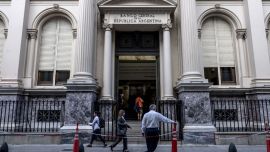As social animals, our collective belief in a certain set of symbolis may constitute sufficient cause for a substantial change in reality. Over the past two weeks, as the feeling of absolute despair in Argentina reached a fever pitch and then slowly dissipated, leaving behind a generalised anxiety but also a hopeful expectation of normalisation, President Mauricio Macri has shown multiple versions of himself in different public appearances. We witnessed the basic Macri – giving a prerecorded two-minute speech that did little more than accelerate the depreciation of the peso – then a shaman Macri – who asked us to believe in his honesty – and finally a relieved Macri who answered journalists’ questions as the peso found temporary stability. What is evident is that the president has lost his oratory power, meaning his message does not appear genuine and therefore fails to have an impact on markets and people. Unless Macri and his team of communications specialists — led by embattled Cabinet Chief Marcos Peña and star Ecuadorean advisor Jaime Duran Barba — can figure out how to broaden the scope of his message in order to reach beyond their core supporters, then ruling coalition Cambiemos (Let’s Change) will have a hard time generating confidence from people and markets on Argentina’s weak economic and political fundamentals, meaning more volatility could be headed this way.
Basic Macri. Despite being described as experts in political communication, Macri and his team failed epically during the last week of August, as the Argentine peso fell off a cliff. In a short message, the president told the people he felt their pain, while announcing that an agreement had been reached with the International Monetary Fund (IMF) to accelerate the payment of an emergency loan in order to eliminate doubts over Argentina’s capacity to pay its debts. A message from the president in the middle of a run on the currency should calm the market, yet the peso continued its drop, hitting a record 42 per dollar the following day.
That weekend the Macri administration went into crisis mode. As journalists and minsters speculated on who’s head would roll, Macri announced Peña, Economy Minister Nicolas Dujovne — who tendered his resignation — and Central Bank President Luis Caputo — pinned as the mastermind of Macri’s communication blunder — would all keep their jobs.
The following Monday, Macri faced the music. In a 25-minute speech, the head of state went through several phases, including his preacher or shaman version. The president asked the nation to support his battle to reduce the deficit, the root of all evil, while blaming external shocks including rising petroleum prices, Argentina’s powerful drought, rising interest rates in the United States and a global trade war for eroding confidence. “These have been the worst five months of my life after my kidnapping,” an honest Macri said, staring straight at the camera. Speaking from the Casa Rosada via a pre-recorded message, he announced export duties — which the IMF had requested — and confirmed a reduction in the number of ministries to streamline decision-making. He admitted one mistake: having believed a gradual solution to Argentina’s endemic economic problems was possible.
Macri was at his most genuine when he continued to put deficit reduction as the only solution to the current financial and economic crisis. He asked society to believe in him and his team, asking for an extra bit of effort to get “to the other side of the river,” once again taking a page from preachers who pin their message on hope. The shaman bases his healing power on a social consensus that validates a set of symbols. It is belief, French anthropologist Claude Lévi-Strauss tells us, in the medicine man’s supernatural power that ultimately accounts for his power, which is social in nature. A virtuous cycle, much like the one Macri hopes to have created since with the relative stabilisation of the peso’s value.
Yet, something was off. Macri never mentioned the Peronists by name, just indicated his team is making progress with budget negotiations with the opposition. He never unveiled a grand plan to unleash the productive capacities of businessmen — a plan which could be nothing more than a shaman’s amulet, but that would help in jumpstarting confidence. He just asked society to believe in him.
The problem is that he has lost his voice. The markets aren’t sure that he can deliver on reforms and many of those who voted for Cambiemos have become disillusioned. A grand plan, involving all productive actors and the opposition would be tremendously useful in building confidence, helping to instill in both the general population and investors the idea that these policies will persist beyond the next electoral cycle.
Communication is an incredibly powerful tool in the public sphere, but it must be employed adequately. Macri and his team demonstrated dexterity in the 2015 presidential elections, using social media to communicate a message of hope, distancing themselves from traditional politics and eventually winning the presidency. In the midst of the current storm, Cambiemos needs more communication, with Macri and his ministers in constant connection with the people. They must engage the middle-class, but also investors and businessmen, and the opposition, of course. Not only must they increase their public exposure, but the government should generate the conditions for a real public debate with non-Kirchnerite Peronists, along with the Radical Civic Union (UCR) which is part of Cambiemos. Macri needs to convince the whole of society by reaching a general consensus that will allow Argentina to overcome the current rough patch in which it finds itself.



















Comments